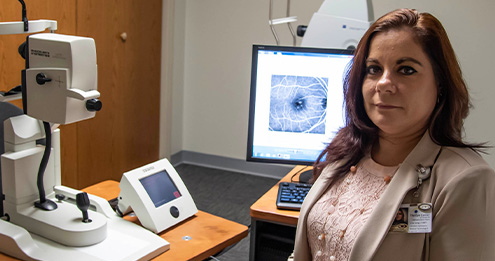- Veteran
- Healthcare
- National Guard
Certification Spotlight
Credentialing success from the Service community
How a retired Combat Medic and Eye Specialist makes a case for credentialing in health care and beyond
Lisa Lenig, Retired Army National Guard
Professional credentialing provides a proven avenue for transitioning Service members to translate their military experience into marketable skills in the civilian sector. Nobody knows this better than retired Pennsylvania National Guard Combat Medic and Eye Specialist Lisa Lenig. With multiple certifications in her field, Lisa has a wealth of insight into how credentialing creates new opportunities for employment and career advancement, specifically for Service members seeking competitive and rewarding post-military careers.

Lisa Lenig, Retired Army National Guard
How long were you in the National Guard? What was your rank?
I spent about six and a half years in the National Guard, beginning in 1997. During my time with the Guard, I served in Kosovo for nine months, and when I got out, I held the rank of Specialist.
Can you describe your current responsibilities as a health care provider in ophthalmology?
My primary certification is a COMT, which stands for Certified Ophthalmic Medical Technologist. Much like in nursing where you have a CNA, LPN and RN, the International Joint Commission on Allied Health Personnel offers a COA, COT and COMT. So I’m currently at the highest level that I can go when it comes to my core certifications. Much of my work has to do with the retina. I take photographs and perform scans, ultrasounds and fluorescein angiography. I also help maintain and calibrate equipment at all 12 of our offices. In addition, I’m on our research team for new medications in ophthalmology and new intraocular lenses that we put in after cataract surgery.
What made you want to get certified?
The main reason that I wanted to get certified was for the sense of pride and accomplishment. I also have the privilege of working for a company that gives out bonuses for completing certifications, so that was a contributing factor as well.
How has credentialing impacted your professional career?
I’m in more of a management position compared to where I was before certification, as I am now the lead photographer and coordinator of diagnostic testing. Before, I was just a work-up technician — the person who would take the patient in the room and get them prepped to see the doctor. Now, I’m able to train technicians on all the new and emerging technologies in our industry.
I’ve also been entrusted with additional duties and responsibilities. Doctors come to me with specific requests because they know that I am going to deliver what they need. I’ve grown substantially from where I was prior to pursuing certification, and that is reflected in the increased level of responsibility I now have.
What do you know now about credentialing that you wish you had known in the past?
Everybody should pursue new skills through certification, and I’m glad to say that more people are realizing this with each passing day. Credentialing makes you a better technician and allows you to provide better patient care.
Our newly certified technicians see a positive change in both their performance and morale because they feel more comfortable doing their job and dealing with patients.
Our newly certified technicians see a positive change in both their performance and morale because they feel more comfortable doing their job and dealing with patients. The knowledge they gain through credentialing truly makes a remarkable difference.
How has credentialing changed during your time in the health care industry?
If you aren’t a credentialed technician, then you aren’t allowed to carry out many vital aspects of the job, including the refilling of eye drop prescriptions. At my practice, technicians have a set timeframe to get their first certification because we need them to be able to perform these duties.
When I first started at my practice, there were only three people that were certified out of about 15 technicians, mainly because it just wasn’t something that was pushed back then. Currently, we have about 38 technicians, and I would say around 16 of them are certified.
Did you encounter any challenges when seeking civilian employment, and do you have any advice for transitioning Service members?
Potential employers didn’t think that my military experience translated into what they were looking for on the civilian side. It wasn’t until I explained to them everything that I learned while in the Service that it became easier for them to see I was a good fit. This is where credentialing can be a huge help.
.jpg)
I understand that some of the MOSs in the Service are hard to transition from, but if you have a certification that says you can perform a specific job function, it makes you look better to potential employers and helps to separate yourself from other applicants.
Conversely, what would be your message to civilian employers looking to hire veterans?
My message to civilian recruiters would be that the military provides extremely great training programs that shouldn’t be overlooked. Their programs are generally fast and efficient, with a focus on applicable job skills, in contrast to your typical college undergraduate experience.
I understand that some of the MOSs in the Service are hard to transition from, but if you have a certification that says you can perform a specific job function, it makes you look better to potential employers and helps to separate yourself from other applicants.
Where do you see credentialing in five years?
I believe that credentialing will become more and more common, especially in health care. Patients feel more comfortable with you if they can look at your name badge and see that you have some form of professional credential. They know that a credentialed professional is going to do the job right, and I believe that this is the reason why we’re going to see a growth in credentialing over the next five years and beyond.
